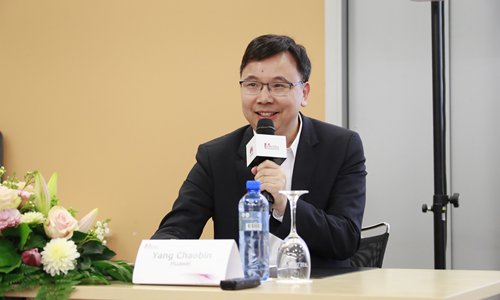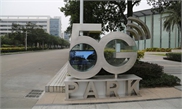SOURCE / INDUSTRIES
Huawei 5G foraying in European market

Yang Chaobin, Huawei's 5G product line president. Photo: Courtesy of Huawei
The year 2019 witnessed a rapid expansion of the 5G industry. Apart from 5G commercialization for the first time, it has also been successfully applied in different business domains. This October, Huawei held the 10th Global Mobile Broadband Forum in Switzerland, embracing the concept of "5G, Gear Up" which perfectly describes the current development of the 5G industry.
Huawei 5G: a continuous growth of commercial contracts and shipments
"In early May of 2019, I presented a number at the news conference in Beijing that Huawei signed more than 40 business contracts and shipped 100,000 modules. However, the numbers have already been updated recently and now over 60 commercial contracts have been secured and over 400,000 modules shipped," said Yang Chaobin, Huawei's 5G product line president. "Among Huawei's more than 60 5G contracts, 32 of them are from Europe. Huawei highly appreciates the long-term support and trust from our European customers. Regardless of how changeable the external situation is, our products will constantly focus on the innovation of 5G technology and solutions, assisting carriers to deploy the networks in a more effective way, which finally intends to benefit our customers," Yang added.
There is no killer application but killer experience
Since the initial announcement of commercial use of 5G has been made this year in April, in the latest 6 months, there are additional over 40 carriers that have recently announced the commercialization of 5G. What explains the rapid growth of the 5G industry and what exactly this 5G killer application is?
"Before the 5G's definition was been standardized, there was a massive argument of 5G killer application. At the start of the 4G era, no one would expect such a big trend of mobile payment, sharing economy, and live broadcast. Reviewing the time of mobile application, the comprehensive and continuous development of every single generation crucially depends on the network capability. In the current 5G era, we promise customers a 10 times better user experience, 30 times enhanced network capability, compared to the 4G era. Once those conditions of 5G network have been fulfilled and regulated, we believe substantial applications could be born sooner," said Yang.
5G FWA applications upgrade the connections and refresh the experience of home broadband
ITU statistics show that over half out of the total 2,000,000,000 households worldwide are not connected to the network, and 80 percent home broadband rates below 100Mbps speed. "In Europe, optical fiber is not completely covered due to the land privatization. 5G technology enables the speed of mobile broadband to be comparable to that of optical fiber, which is the ideal choice for most suburban families. Europe targets to achieve that 50 percent household get access to the home broadband in which 5G will play a significant role," Yang said.
The industry is actively exploring the wide use of 5G applications
The 5G technology is characterized by wide bandwidth, high speed, and low latency, and this supports the expansion of 5G in various fields including internet of vehicles, smart factory, HD live broadcast, smart healthcare, and smart ports, etc.
In the new media area, applying 5G network and CPE (Customer Premise Equipment) as the substitution to Satellite News Gathering effectively ensures the streaming of 4K/8K HD live broadcast and sharply reduces the cost of live the broadcast. In the smart healthcare area, conducting remote consultation on ambulances via a 5G network saves patients from emergencies. Meanwhile, the 5G consulting room which arranges remote consultation will tackle the problem of uneven distribution of medical resources.
"What we've currently achieved is just a tip of the iceberg of the entire industry. Carriers worldwide have collaborated with different departments, engaging in the exploration of 5G technology to diversify 5G applications. Along with the implementation of the 5G network on a worldwide scale, we believe 5G technology will gradually be applied in various industries and domains, and finally achieve its commercial success.
The entire industry works jointly on solving 5G security concerns
Responding to security issues, Yang said, "Security concern is a major issue not just for Huawei but it is a tough challenge for the entire industry. On one hand, 5G security infrastructure is an ecosystem that is being classified into different layers and domains. Each layer and domain is solely responsible for a subject. The different sectors include application developer, service provider, terminal manufacturer, equipment supplier, among others. The online operator should take the individual responsibility to their security. On the other hand, in order to tackle security problems, about five years ago, the industry had initially started its campaign to introduce the specialized security certification upon the mobile device area. This year, together with 3GPP and other related companies, we collaboratively formulated the South Central Ambulance Service and the relevant standards have already been officially set and released. At the same time, GSMA with other cooperative partnership companies has also publicly issued NESAS, the security certificate specification. We honestly believe the security concerns should directly be attributed to the technological problem. We are willing to work with organizations, governments, and industry partners worldwide to tackle the security issues by improving and updating current technology, thus, ensuring the online safety of our users. "

